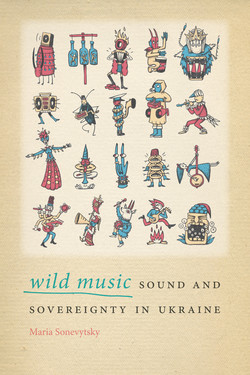Читать книгу Wild Music - Maria Sonevytsky - Страница 11
На сайте Литреса книга снята с продажи.
ОглавлениеNOTE ON NAMES AND TRANSLITERATION
This book contains translations and Romanizations from three different languages with complex and politicized relationships to orthography and transliteration. Where possible, I have included the original Cyrillic for readers familiar with that alphabet.
For Ukrainian, I generally follow the transliteration standards adopted in 1996 as the Ukrainian national system. I prefer to use the Ukrainian transliteration of places located in Ukraine, even when norms of transliteration into English favor the Russian transliteration. For example, I write Kyiv (from the Ukrainian Київ, rather than Kiev), Chornobyl (Чорнобиль, rather than Chernobyl), and L’viv (Львів, rather than Lvov). When Romanizing Russian, I use the ICAO system that was adopted in 2013, in part to minimize the use of diacritics in the text. I hold to these standards unless an individual or group represents their names or terms using different systems of transliteration. In such cases, I follow their lead.
The Crimean Tatar language presents some especially complex issues. Typically, in this book, I transliterate from the Cyrillic system that was adopted in the mid-twentieth century because the majority of texts I depended on were either produced during the Soviet period, or in post-Soviet publications that favored Cyrillic over Turkic (or Arabic) rendering of the language. However, I do occasionally transliterate terms to connote the specific sounds of Crimean Tatar that are difficult to convey with strict transliteration from Cyrillic, so instead of the term “Khaytarma,” (rendered in Cyrillic frequently as “Хайтарма”), I opt for the transliteration as “Qaytarma,” which indicates that the initial phoneme is a voiceless uvular stop. (In Cyrillic, this phoneme is better approximated with the combination of “К” followed by the hard sign from Russian, “ъ.”)
A final note: some activists have moved to refer to themselves as “Crimeans” (in Ukrainian: Кримці or Krymtsi; in Turkic: Qirimli or sometimes Kirimli) rather than “Crimean Tatars.” I have not observed these practices due to the fact that “Crimean Tatar” remains the dominant internationally recognized ethnonym for the group. For this reason, I also write “Crimea” instead of Krym or Qirim. That said, I acknowledge the importance of the campaign to jettison the vague and colonial term “Tatar,” which was applied as the generic term for all Muslim subjects living on the territory of the former Russian Empire.
The vast majority of the formal and informal interviews for this project were conducted in either Ukrainian or Russian and have been transcribed and translated on the basis of field recordings. When I have reconstructed dialogue from field notes, I do not represent speech in quotation marks, unless I jotted it into my fieldnotes with quotation marks. Unless otherwise noted, translations are my own.
I present the identities of my interlocutors in various ways. In some cases, with their permission, I include full names. In others, in cases of more sensitive information, I do my best to fully anonymize sources. When I write about well-known musicians and bands, I typically use the full names of individuals if there is other information presented that would make them identifiable. In the case of celebrities, since my access to such individuals was for the most part restricted to their publicly available speech, I use full names.
